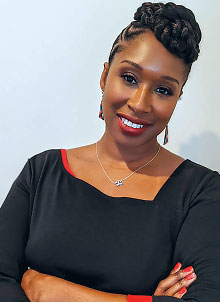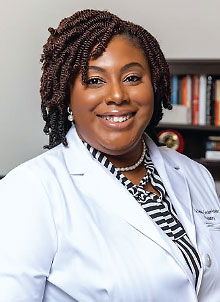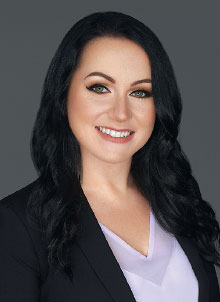WEL Offers Leadership Development, Better Health for Women M.D.s
Abstract
A five-year initiative has worked to improve retention of women physicians by boosting their leadership savvy, offering mentoring, and focusing on their personal wellness. Several psychiatrists describe how participating has changed their careers.
To help build a healthier and more equitable work environment for women physicians, six major medical groups, including APA, joined forces to create a unique leadership development program.
The Women’s Wellness through Equity and Leadership (WEL) has been a five-year endeavor spearheaded by the American Academy of Pediatrics (AAP) that aims to foster leadership skills and personal wellness in women physicians.
“This type of program is needed because there is growing evidence that women physicians including psychiatrists are leaving or considering leaving the profession, especially in view of the pandemic,” Theresa Miskimen M.D., medical director and chair of the Department of Psychiatry at Hunterdon Behavioral Health Care, told Psychiatric News. She represented APA on the WEL steering committee and recommended faculty and mentors to serve the program.
“The program equips scholars with the skills and negotiating knowledge needed to have a seat at the table and to be involved in organizational decision-making,” added Miskimen, who is also a past speaker of the APA Assembly. “This, in turn, addresses head-on the sentiment that women physicians aren’t treated with respect in the workplace.”
Miskimen said participants describe their experience as “life changing; career changing; and, in some cases, transformative.”
As of September, 68 early to midcareer physicians—including eight psychiatrists—have now graduated as “scholars” of the program in two separate classes. Many have gone on to launch their own businesses focused on improving health at the population level or giving back to their community, with a focus on underrepresented groups. For example, one scholar provides anti-racism training to organizations, and another provides mentorship and assistance to underrepresented high schoolers aiming to be pre-medical college students.
WEL’s ‘Indelible Mark’

WEL gave Nicole Christian-Brathwaite, M.D., the confidence to launch her own business. In addition to helping patients in her private practice, she also works at the corporate level to help organizations find ways to become more anti-racist and trauma-sensitive.
“Participating in the WEL program changed my career trajectory. It gave me motivation and confidence that I didn’t have before,” Nicole Christian-Brathwaite, M.D., a child, adolescent, and adult private practitioner and CEO and founder of Well Minds Psychiatry and Consulting in Boston, told Psychiatric News. She said once she entered psychiatry, she felt stymied by the lack of interaction with physicians in other branches of medicine and parts of the country. “The WEL program spoke to me because it focused on developing my leadership skill set, as well as forming a sisterhood with other women in medicine.”
After several months of participating in WEL, Christian-Brathwaite launched her own business in 2019. She had avoided doing so in the past due to fear of failure, she said. Her business now serves to educate parent groups, schools, and medical practices on how to support their most vulnerable members. It focuses on helping organizations align with children of color and other minority groups by becoming anti-racist and trauma-sensitive. “Now I’m making an impact not only on the kids and adults I see individually, but also on a much larger scale,” she said.
WEL participants begin by fleshing out their “indelible mark,” in other words, defining their vision and their legacy. They then meet regularly in small groups to discuss their progress. “My initial [business] draft was very modest, but fellow WEL colleagues really pushed me to step outside my comfort zone and think bigger,” she said.

“I didn’t realize that part of my strategy to preserve my energy and invest in the things that are most important to me is to say ‘no’ and to be comfortable with being disliked for it,” says Kimberly Gordon-Achebe, M.D.
Kimberly Gordon-Achebe, M.D., a child psychiatrist, CEO and founder of BHETC LLC, and academic training director, graduated from the second WEL class in September. “What was missing for me in my development as a leader was a focus on my own wellness,” she told Psychiatric News. As a result, she suffered from burnout early in her career and considered resigning from many of her roles.
“I had this belief system that when I became a doctor, I had arrived,” said Gordon-Achebe, a member of APA’s Membership Committee. “Yet the reality set in that I would have to fight a lot more to have a level playing field.” Many of her colleagues in WEL shared that view: They served as their household’s primary breadwinners yet also managed child care and eldercare responsibilities too—pressures that increased during the pandemic, she recalled. “Yet we are earning less than the men. That’s a justice issue.”
WEL refined Gordon-Achebe’s knowledge about contract and salary negotiation, as well as conflict resolution, delegation of responsibility, network building, and creation of a support system. Perhaps most importantly, she said, she learned the critical importance of saying no.
“I didn’t realize that part of my strategy to preserve my energy and invest in the things that are most important to me is to say ‘no’ and to be comfortable with being disliked for it. … Wellness for me is about getting my power back, knowing that I have the power to assert myself in the workplace and understand how organizations work.”
Inequities for Women M.D.s
Once predominantly a field of White men, women now make up 55% of the psychiatry workforce. Despite women’s progress in entering the profession, inequities remain, including far fewer opportunities for advancement and higher rates of reported gender-based bias, harassment, and discrimination. There is also a sizable pay gap.
One recent study showed that women physicians in academia earn hundreds of thousands of dollars less than men just in the first decade on the job, according to the Association of American Medical Colleges (AAMC) 2021 report (“Women in Academic Medicine Still Paid Less Than Men”).
“Research shows that women physicians have less control over the day-to-day aspects of their work ... and often shoulder more of the demands of balancing their work life with home life, so they experience and report more burnout than male physicians,” Cheryl de Pinto, AAP senior vice president of primary care and subspecialty pediatrics, told Psychiatric News. “The WEL program is designed to promote women and equip them with the information, tools, and skills they need to advocate for themselves.” The idea is that they will bring these principles back to their institutions and the hospitals and promote them across their larger organizations.

Audrey La Noce, D.O., says that participating in WEL led her to apply to serve on APA’s Council on Advocacy and Government Relations and work toward her goal of influencing national policy on mental health.
Audrey La Noce, D.O., founder/CEO of Total Mental Wellness and the Broward County Chapter president of the Florida Psychiatric Society, told Psychiatric News that participating in WEL led her to apply to serve on APA’s Council on Advocacy and Government Relations. She said she is now closer to her goal of influencing national policy on mental health. “These women were true doctor-scholars, including professors and department heads from very prestigious institutions. It was an amazing group of women. Yet one of the things that shocked me is that when we broke it down, we all shared the same struggles and stresses, including low self-confidence and imposter syndrome. ... Even these very powerful women felt that they didn’t fit the role, despite being promoted, elevated, and given awards.”
La Noce says WEL heightened her awareness of the struggles for women doctors, particularly those who are members of underrepresented groups, as well as her commitment toward equity.
Future of WEL Being Examined
WEL was funded by the Physicians Foundation and the Josiah Macy Jr. Foundation. Since WEL’s founding, four additional medical associations joined, including the AMA. Now organizers are pursuing the funding needed to continue the program, Janna Patterson, M.D., AAP senior vice president of global child health and life support, told Psychiatric News.
“For women to overcome the barriers they’re facing also requires institutional change. We are looking at continuing the WEL program, but we also plan on digging in to determine how we can create institutional change to support women physicians.”
Gordon-Achebe said having funding for WEL will help more women feel that they can rise to the occasion and address inequity in health care. “The endgame is for all of us to have equal opportunities, not only in the workplace but also in our personal lives.” ■



